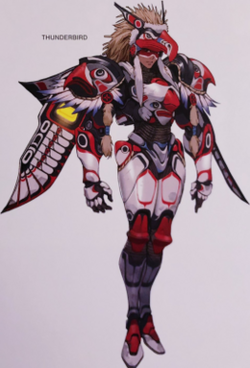Pharah
Pharah, real name Fareeha Amari, is a character who first appears in the 2016 video game Overwatch, a Blizzard Entertainment-developed first-person shooter.
Voiced by Jen Cohn, she is an Egyptian woman trying to follow in her mother's footsteps, enlisting in a military unit and helping to defend her local community, going by the call sign "Pharah".
Video game media and academic writers have mixed feelings on Pharah's characterization, with the portrayal of her various ethnic backgrounds and representation of women being considerably discussed.
Depicted as half-Egyptian and half-Indigenous Canadian, some have viewed Pharah's portrayal through a white voice actress and Indigenous-themed skins in-game as unfavorable.
Blizzard's lack of development in the way of Pharah's official narrative elements has also been lamented, while many fan-generated depictions of the character have emerged and been discussed by various media outlets.
Artist Justin Thavirat submitted a design consisting of black armor suit with a large mag-fed rocket launcher that was well received by the development team,[6] and even included in the original pitch meeting for the game.
"[1] Working on Pharah assisted the development team with establishing the game's visual style, as well as providing a guide to the overall look for its future playable characters.
She wears a full-body blue and black combat suit with gold highlights dubbed the "Raptora Mark VI", that features independently posable wings with thrusters that allow for short-term flight.
[14] Two notable skins include "Thunderbird" and "Raindancer", which are based on Indigenous imagery, specifically the art motifs of Pacific Northwest cultures.
[21] In it, an aggressive artificial intelligence called "Anubis" at the facility breaches containment and proceeds to take control of surrounding robots to attack everyone, including Pharah and her team.
[22] She later appears in the second issue of Overwatch's New Blood comic miniseries, protecting a community from the terrorist group Talon, when she is approached by her childhood friend Cassidy, and later her estranged mother.
[29] Additionally, in Overwatch 2, Pharah gains a short-term boost to her reload and movement speed after killing an enemy, due to a new passive ability given to all "damage" class characters.
[20] In a Reddit "ask me anything" thread with the Overwatch developers, Geoff Goodman compared Pharah's gameplay to that of another first-person shooter, Tribes.
"[46] Biologist and Paleontologist Rodrigo B. Salvador cited Pharah's design as heavily influenced by her nationality in a paper for The Journal of Geek Studies, noting that her armor and tattoo took heavy inspiration from the Egyptian god Horus and the significance of those elements in her design, specifically the lancer falcon which he felt was implied both by the suit's name and its bird-shaped helmet.
He further conflated her role and character in Overwatch to that of a pharaoh whose duty is to uphold "truth, harmony, morality and justice" due to her name, personality and portrayal.
[50] Amr Al-Aaser of Waypoint was particularly critical of her design, feeling that the use of Egyptian imagery "the existence of an entire people to easily recognizable images", while also denouncing the choice of a white voice actress for her character.
[17] Shahryar Rizvi of Kill Screen commented that despite the skins being designed with Pacific Northwest Coastal cultures in mind, that the "face paint is most likely influenced by the Mohawk people in Ontario, Quebec, and upstate New York".
'"[17] Lacina also opined that "corporate interests and fandom demands aligned so they can make those skins 'acceptable' while getting bonus points for finally having a Native in Overwatch's lore.
[51] Her reveal as a lesbian was more positively received, with The Gamer's Harry Schofield praising the writing of the short story for how well it portrayed her as a queer character talking with a friend.
